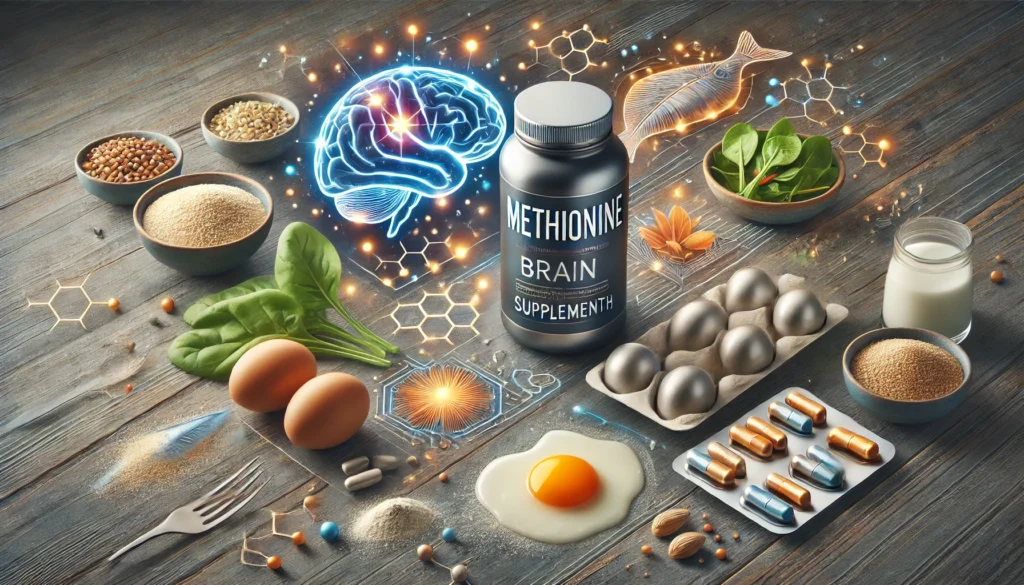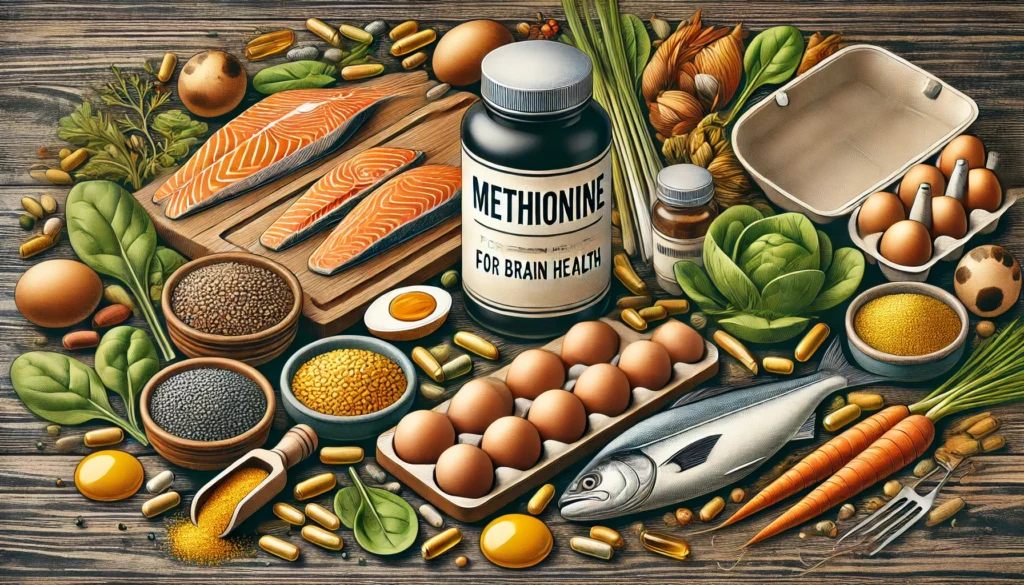Methionine is an essential sulfur-containing amino acid with significant implications for human health and cognition. As one of the nine essential amino acids, methionine cannot be synthesized by the human body and must be obtained through diet or supplementation. While its primary role is in protein synthesis and as a precursor for several critical molecules in the body, recent interest has emerged in its potential nootropic benefits.
This article delves into the chemistry of methionine, its physiological mechanisms of action, and its role in cognitive function. It also explores the appropriate dosages, possible side effects, interactions with other supplements and drugs, and safety considerations for individuals with specific health conditions.
You May Also Like:
Sources of Methionine
Methionine is primarily obtained from dietary protein sources, particularly those derived from animals. Rich dietary sources include meat, fish, poultry, dairy products, eggs, and certain seeds and nuts. Plant-based sources such as legumes, lentils, quinoa, and soy contain lower amounts of methionine, though these can still contribute to overall intake when included in a balanced diet.
Animal-based sources:
- Meat and poultry: Beef, chicken, turkey, and lamb are excellent sources of methionine.
- Fish and seafood: Salmon, tuna, and shrimp are rich in methionine.
- Dairy products and eggs: Milk, cheese, and eggs are also notable sources.
Plant-based sources:
- Nuts and seeds: Almonds, sunflower seeds, and sesame seeds.
- Legumes: Lentils, chickpeas, and beans.
- Whole grains: Quinoa, oats, and brown rice are moderate sources of methionine.
For individuals who may have dietary restrictions or prefer a plant-based diet, supplementation of methionine may be necessary to meet daily requirements, particularly in those following a vegan or vegetarian regimen.

Chemistry of Methionine
Methionine is an essential sulfur-containing amino acid with the molecular formula C₅H₁₁NO₂S. It is the only amino acid that contains sulfur in its side chain, which is a key component in several biochemical processes. Methionine is classified as a nonpolar, aliphatic amino acid due to the hydrophobic nature of its side chain.
- Structure: Methionine consists of a basic amine group (–NH₂), a carboxyl group (–COOH), and a side chain containing sulfur (-CH₂–S–CH₃). This sulfur group is highly reactive and plays a critical role in the amino acid’s biological functions.
- Biosynthesis: As an essential amino acid, methionine cannot be synthesized by the human body and must be obtained through diet or supplementation. It is primarily derived from dietary protein sources, particularly meat, poultry, fish, dairy, and some plant-based foods like nuts and seeds.
- Conversion to SAMe: Once ingested, methionine undergoes conversion into S-adenosylmethionine (SAMe), a methyl donor in numerous biochemical pathways. This conversion occurs through the addition of an adenosine group, which is catalyzed by the enzyme methionine adenosyltransferase.
Physiological Mechanism of Action of Methionine
Methionine plays a central role in several vital physiological processes in the body, including protein synthesis, methylation, and antioxidant defense. After ingestion, methionine is primarily metabolized into S-adenosylmethionine (SAMe), a potent methyl donor involved in methylation reactions. These reactions are critical for regulating gene expression, modulating protein function, and influencing various biochemical pathways, particularly in the brain. SAMe is involved in the synthesis of neurotransmitters such as serotonin, dopamine, and norepinephrine, which are essential for mood regulation, cognitive function, and mental clarity.
In addition to its role in neurotransmitter synthesis, methionine is a precursor to homocysteine, an amino acid whose elevated levels are associated with cardiovascular and neurological risks. Through the action of enzymes like methionine synthase, homocysteine can be converted back into methionine, provided adequate levels of vitamins B12 and folate are present. This homocysteine metabolism is important for maintaining vascular health and preventing cognitive decline. Furthermore, methionine’s sulfur-containing side chain is involved in the synthesis of glutathione, one of the body’s most potent antioxidants.
Glutathione helps protect cells from oxidative stress and supports detoxification processes in the liver and brain. This antioxidant function is particularly important in protecting the brain from neurodegenerative diseases and promoting overall cognitive health. Methionine’s impact on both the body and brain is thus multifaceted, influencing cellular health, methylation processes, neurotransmitter synthesis, and oxidative stress regulation.

Methionine as a Potential Nootropic Supplement
The interest in methionine as a nootropic stems from its involvement in several processes critical to brain health. Its role in methylation, neurotransmitter synthesis, and antioxidant defense makes it an attractive candidate for cognitive enhancement. While methionine is not typically considered a direct cognitive enhancer, it may exert nootropic benefits by supporting the underlying biochemical mechanisms that contribute to optimal brain function.
Potential Nootropic Benefits of Methionine
- Mood Regulation: Methionine’s role in the synthesis of neurotransmitters such as serotonin and dopamine has implications for mood regulation. SAMe, derived from methionine, has been studied for its potential antidepressant effects, with some research suggesting that it may be as effective as conventional antidepressant medications for certain individuals. By promoting balanced neurotransmitter levels, methionine supplementation may help stabilize mood and reduce symptoms of anxiety or depression.
- Cognitive Function and Memory: Methionine’s involvement in the production of SAMe and its influence on methylation may contribute to enhanced cognitive function. Methylation plays a role in the regulation of gene expression, which can impact neural plasticity—the brain’s ability to adapt and form new connections. This process is essential for learning, memory, and overall cognitive performance. While research on methionine specifically as a nootropic is limited, its indirect influence on cognitive health is supported by its role in maintaining proper brain chemistry.
- Neuroprotection: The antioxidant properties of methionine, through its conversion to glutathione, may help protect neurons from oxidative damage. Oxidative stress is a significant factor in the aging of the brain and the development of neurodegenerative conditions such as Alzheimer’s disease and Parkinson’s disease. By supporting glutathione production, methionine may help reduce the risk of neurodegeneration and preserve cognitive function over time.
- Cognitive Enhancement in Specific Populations: Some studies suggest that methionine supplementation may be particularly beneficial for individuals with certain cognitive impairments or neurological conditions. For example, people with low levels of SAMe or those with homocysteine metabolism disorders may experience improvements in cognitive function with methionine supplementation.

Dosage and Recommended Intake
Methionine is typically consumed as part of a balanced diet rich in protein, but supplementation may be recommended for individuals who are deficient in this amino acid or are seeking specific cognitive benefits. The recommended daily intake of methionine varies based on individual needs, but general guidelines suggest that adults require around 10-15 mg of methionine per kilogram of body weight. This translates to approximately 700-1,000 mg per day for most adults, though some individuals may require higher doses based on specific health conditions.
In the context of nootropic supplementation, doses typically range from 500 mg to 2,000 mg per day. Higher doses may be used for therapeutic purposes, such as improving mood or addressing homocysteine imbalances, but it is important to approach supplementation cautiously and consult with a healthcare provider before starting a regimen, especially at higher doses.
Side Effects and Safety Considerations
Methionine is generally considered safe when taken in appropriate doses, particularly when obtained from dietary sources. However, high doses of methionine supplementation may lead to certain side effects, including:
- Nausea and gastrointestinal discomfort: Some individuals may experience digestive issues, such as nausea, bloating, or stomach cramps.
- Increased homocysteine levels: Excessive methionine intake, particularly when combined with deficiencies in B12 or folate, may lead to elevated homocysteine levels, which have been linked to cardiovascular disease and cognitive decline.
- Neurotoxicity at very high doses: Long-term use of high doses of methionine may have neurotoxic effects, especially if not balanced with other nutrients that support homocysteine metabolism.
- Potential for exacerbating certain health conditions: Individuals with pre-existing kidney disease or those at risk for cardiovascular disease should use methionine supplementation cautiously, as high levels of methionine may contribute to kidney stress or vascular issues.

Interactions with Other Supplements and Medications
Methionine supplementation can interact with several medications and supplements, including:
- Antidepressants and mood stabilizers: Given methionine’s potential to influence serotonin and dopamine levels, it may interact with medications that affect these neurotransmitters, such as selective serotonin reuptake inhibitors (SSRIs) or monoamine oxidase inhibitors (MAOIs).
- Folate and B12 supplements: As methionine metabolism requires adequate levels of folate and vitamin B12, supplementation with these nutrients is often recommended when taking high doses of methionine to avoid homocysteine accumulation.
- Anticoagulants: High levels of homocysteine have been linked to blood clotting, so individuals on blood thinners or anticoagulant medications should consult with their healthcare provider before using methionine supplements.
Conclusion
Methionine is a critical amino acid with essential functions in protein synthesis, methylation, and detoxification processes. While it is not typically regarded as a primary nootropic, its role in supporting cognitive function through its involvement in neurotransmitter synthesis and antioxidant defense makes it a valuable supplement for promoting brain health.
However, methionine supplementation should be approached with caution, particularly at higher doses, and under the guidance of a healthcare professional. Individuals with specific health conditions or those taking certain medications may be at greater risk for adverse effects and should consider potential interactions before adding methionine to their regimen. As with any supplement, proper dosing, monitoring, and balanced nutrition are key to ensuring safety and maximizing the benefits.
Methionine, when used appropriately, can support overall cognitive function and contribute to general well-being, particularly for those who may be deficient due to dietary restrictions or other factors. However, its potential nootropic benefits, while promising, should not overshadow the importance of a balanced and varied diet rich in other essential nutrients. Always consult with a healthcare provider before starting any new supplement, especially for individuals with pre-existing health conditions or those taking medications that may interact with methionine. By carefully considering dosage, timing, and individual health needs, methionine can be a useful addition to a holistic approach to brain health and cognitive enhancement.

References:
- Methionine: Functions, Food Sources and Side Effects. Retrieved from: https://www.healthline.com/nutrition/methionine
- Benefits and Drawbacks of L-Methionine. Retrieved from: https://www.webmd.com/vitamins/ai/ingredientmono-42/methionine
- Methionine – Uses, Side Effects, and More. Retrieved from: https://www.webmd.com/vitamins/ai/ingredientmono-42/methionine
- Methionine as a double-edged sword in health and disease: Current perspective and future challenges. Retrieved from: https://pubmed.ncbi.nlm.nih.gov/34700006/
- What Is Methionine? Benefits and Top Food Sources. Retrieved from: https://draxe.com/nutrition/l-methionine/
- The role of methionine on metabolism, oxidative stress, and diseases. Retrieved from: https://pubmed.ncbi.nlm.nih.gov/28929442/
Important Note: The information contained in this article is for general informational purposes only, and should not be construed as health or medical advice, nor is it intended to diagnose, prevent, treat, or cure any disease or health condition. Before embarking on any diet, fitness regimen, or program of nutritional supplementation, it is advisable to consult your healthcare professional in order to determine its safety and probable efficacy in terms of your individual state of health.
Regarding Nutritional Supplements Or Other Non-Prescription Health Products: If any nutritional supplements or other non-prescription health products are mentioned in the foregoing article, any claims or statements made about them have not been evaluated by the U.S. Food and Drug Administration, and such nutritional supplements or other health products are not intended to diagnose, treat, cure, or prevent any disease.


